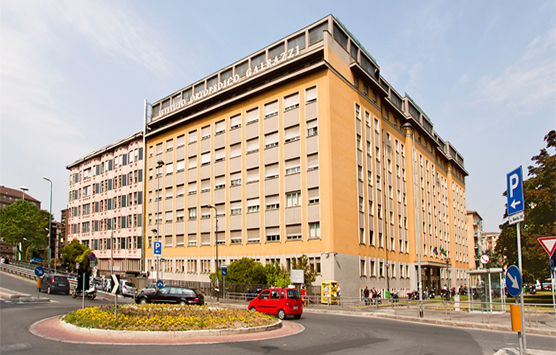ABOUT US
Galeazzi Orthopaedic Hospital (Istituto Ortopedico Galeazzi) is a teaching and research hospital in Milan, Italy. Since 2006, the hospital’s research activities concerning diseases of the movement apparatus have been accredited by the Italian Ministry of Health; thus, Galeazzi is one of the Institutes for Care and Scientific Research (IRCCS).
IRCCS Galeazzi provides care for all orthopaedic diseases and was the first orthopaedic hospital in Italy to perform some complex surgeries, such as arthrodesis and hip, knee and ankle arthroplasties. Moreover, movement disorders and metabolic diseases are also treated. Besides orthopaedics, some additional specialties are present in the hospital, such as rehabilitation, dermatology, oral surgery, maxillo-facial surgery, plastic surgery, neurosurgery, and endocrinology.
IRCCS Galeazzi’s aim is to define, program, and provide top-level care associated with high quality research in bone and muscle diseases, following a 40-year tradition of innovative medical care through new procedures, new bioengineering techniques, and evidence-based and translational medicine.

The strong link between high-quality care and innovative and clinically-based research allows our hospital to project, develop, and release new organizational models for healthcare; to increase the skills and qualification of healthcare personnel; to enhance the learning experience for graduate and postgraduate students; and to maximize the correct information of our services, treatments, and outcomes for patients.
Academic partnerships
IRCCS Galeazzi has a crucial agreement with University of Milano, School of Medicine and School of Sport Sciences. The agreement allows for the sharing of research and clinical activities as well as the promotion of didactic activities in the hospital. Six different clinical units are directed by professors of University of Milano, connecting patient care with research and learning. IRCCS Galeazzi is also linked with Politecnico di Milano, traditional partner for bioengineering researches.
Research areas
The research in IRCCS Galeazzi is typically aimed towards the musculoskeletal apparatus, considering three main pillars: 1) Clinical Research; 2) Biotechnology, and 3) Bioengineering. Within these 3 pillars, there are 4 broad lines of research:
FOCUS 1: Tissue engineering and advanced cell therapy
This focus aims to define, evaluate, test, and apply tissue engineering technologies, in particular through cell therapy and cellular derivatives (secretoma), from regeneration and repair of the tissues of the musculoskeletal system to applications in association with medical devices.
FOCUS 2: Surgical, pharmacological, and technological innovations
The principal focus of clinical care and research activity of the Galeazzi Orthopedic Institute is centered around orthopedic surgery, prosthetic surgery, trauma surgery, and neurosurgery. Hence, there is a growing need to study and innovate new surgical techniques and materials by designing biomedical and biotechnology devices with a multidisciplinary approach to musculoskeletal and neuromuscular pathology. An additional field of study and application is infection control post-prosthetics, with particular attention to the formation of bacterial biofilm and methods to overcome this physical barrier.
FOCUS 3: Bioengineering applied to surgical and rehabilitative therapies
In general, this line of research includes the development, validation, and use of bioengineering methods for the study of orthopedic pathologies, conservative and surgical therapies, and rehabilitation. The methods used include computational biomechanics simulation, motion analysis, and technologies such as telerehabilitation and functional magnetic resonance imaging. Development of guidelines for health policies and assessment through methods of Health Technology Assessment of new technologies are also planned. In particular, we intend to evaluate new rehabilitation models in clinical practice by promoting E-Health.
FOCUS 4: Biochemistry, genetics, physiology, and related systemic diseases
The focus includes the study of the etiological and pathogenic factors of the musculoskeletal diseases and of all the local and systemic modifications induced by pathology (and / or the relative therapy). This area of research also includes the evaluation of interrelationships between different disciplines in order to optimize the diagnosis and treatment phase of the patient with the goal of not only the healing the specific disease but trying to improve the whole care of the person.
